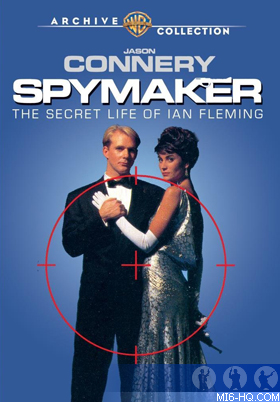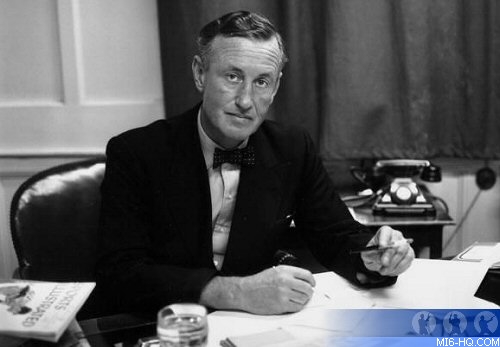Spymaker - Review
30th October 2013
As the highly-fictionalised account of Fleming's life enjoys a DVD release this year, guest writer Matthew Kresal finds out how it stands up today
Originally broadcast more than twenty years ago during the long gap between Licence To Kill and Goldeneye, "Spymaker": The Secret Life Of Ian Fleming has only just now been released on DVD as part of the Warner Archive Collection after having long been out of print on VHS. Claiming to be based on Fleming's life and exploits which inspired the creation of Bond, this TV movie also cast Jason Connery (the actor son of Sean Connery) in the role of Fleming. So is "Spymaker" a good Fleming biopic or a even a good movie?
Viewers coming to "Spymaker" thinking they're going to get an accurate depiction of Fleming's life must instead take what the film presents with a grain of salt, for it can at best be called heavily fictionalised. The film contains many kernels of truth but the script by veteran TV movie writer Robert J. Avrech often takes them and crafts them into bigger events. A perfect example is the portion of the film that sees Fleming covering the Moscow show trial of British engineers accused of sabotaging Soviet factories. "Spymaker" not only includes Fleming's coverage, but then crafts a story involving the Russian girlfriend of one of the engineers, a woman claiming to be a Russian princess, a rooftop chase and Fleming escaping Moscow clinging to the bottom of a train. Another example is later in the film where Fleming plays Baccarat against German General Hellstein in Lisbon, an incident based on a real event where Fleming played against a German agent. "Spymaker" not only uses the incident as part of an entirely fictional struggle between Fleming and this German general but also reverses the outcome of the real-life game. Viewers might also note during the same scene that Fleming at one point lays out two chips next to a seven on the card table, somewhat subtly calling up 007. |
In other places, "Spymaker" is closer to life. Leda St Gabriel, played by a then up and coming Kristen Scott Thomas, shares characteristics with some of the woman in Fleming's life around the time the movie is set but perhaps none more so than his wartime lover Muriel Wright. A scene where Fleming presents three prostitutes as part of a plan to drop them in occupied Europe as spies which leads to Fleming asking his boss Admiral Godfrey if he got his memo and Godfrey's response that "You send me a hundred memos a week!" calls to mind some of Fleming's more outlandish wartime plans. Also, while the film's final sequence involving Fleming leading a raid on a German intelligence headquarters is entirely fictional, it does echo some of operations carried on by the 30 Assault Unit which Fleming helped to organize (and which itself was the subject of the heavily fictionalized film "Age Of Heroes"). All in all, readers of Fleming biographies or even those who have seen the Fleming biography extra on the various DVD and Blu-Ray releases of "The Living Daylights" will likely be able to spot a lot of "Spymaker"'s often vast fictionalizations.
Perhaps oddly for a movie claiming to be based on the life of Fleming, "Spymaker" draws far more on the cinematic Bond than the literary Bond. The entirely fictional character of Quincy, played by Julian Firth, who is a tinkerer who becomes the gadget master for Naval Intelligence is a perfect example. Marsha Fitzalan character Miss Delaney brings to mind Miss Moneypenny with her flirting with Fleming early on and her tossing Fleming's hat onto the hatstand, something fan's will likely remember from the early Connery films. Fleming also spends a good deal of screen time in a tuxedo, visiting a couple of casinos and a couple of martinis shaken not stirred are ordered all in Bond film tradition. Last but not least, the aforementioned and entirely fictional castle assault calls to mind similar sequences in numerous Bond films but perhaps none more so than that of "You Only Live Twice". There are also moments where the score by Carl Davis evokes some of the John Barry style of Bond music as well. Fans of the literary Bond will pick up on some references as well such as the way that the encounters at the gambling tables between Fleming and General Hellstein which call to mind Bond and Le Chiffre in "Casino Royale" or perhaps a certain book that Fleming gives to Leda St Gabriel as a gift. The result is a mix of fact and fiction that at times comes across as forced and yet is far more successful in others.
|
As a movie, "Spymaker" fares better. While Jason Connery's stunt casting is both obvious and far from original, he nevertheless does a fair job as Fleming though he does come across as wooden in a couple of occasions. More successful is Kristen Scott Thomas who comes across well as a character intended to be the Bond girl prototype. The cast also includes former Bond girl Fionna Fullerton who appears for a couple of minutes very early on while Julian Firth and Marsha Fitzalan do well as characters clearly inspired by the Bond films rather than real life. The supporting cast is nicely rounded out by David Warner as Admiral Godfrey, Patrica Hodge as Fleming's mother and Joss Ackland as General Hellstein.
The production values are perhaps better than average for a TV movie, especially one doing a period setting. The sets and costumes call up much of the movie's period flavor from the wonderful evening gowns in the casino scenes to the weapons and uniforms seen during the film's second half. Veteran TV director Ferdinand Fairfax does a superb job of directing the movie and making what must have been a fairly small budget to good use. The only place where the limited budget becomes obvious in a couple of moments involving special effects shots that don't quite work but the results are overall more than satisfactory.
"Spymaker" ultimately can be seen as two things. The first is a highly fictional screen telling of Fleming's life that tries too hard at times to make connections with the world of Bond. What it is perhaps better as is an attempt to do a psuedo-Bond film in a period setting and it's indeed interesting to contemplate that, with a few changes, "Spymaker" could almost as easily be the origin story of Bond as it is a biopic of his creator. For its faults as a Fleming biopic then, "Spymaker" could easily be the closest things fans are likely to get to a period Bond film and for that reason alone is worth seeking out.
Share The Story
The opinions expressed in this review are those of the author and do not necessarily reflect those of MI6-HQ.com or its owners.











